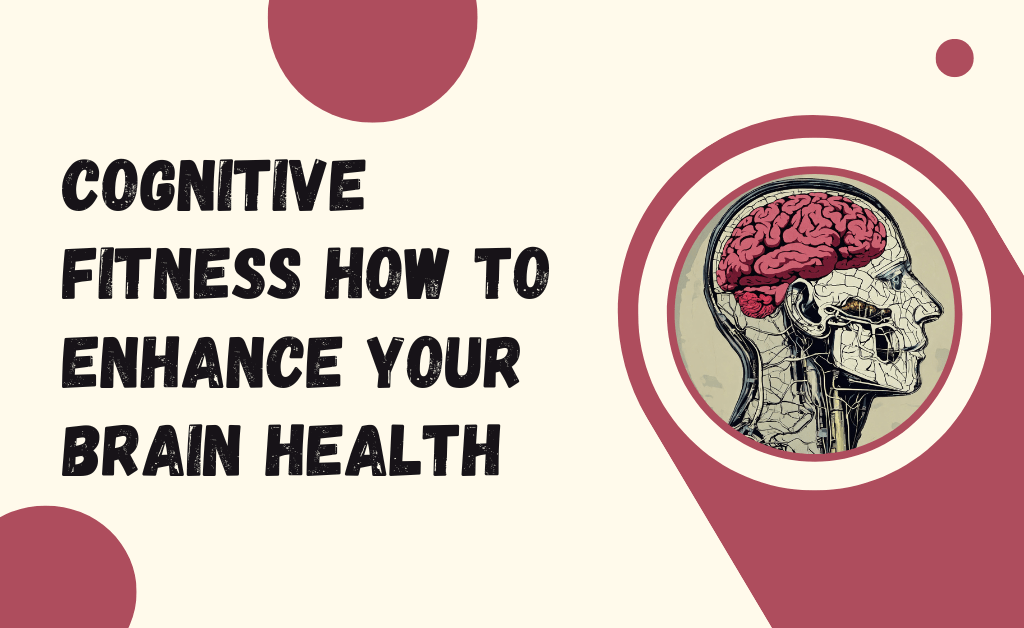Your brain is the most complex organ in your body. It controls everything you do, from thinking and feeling to moving and breathing. Just like any other muscle, your brain needs exercise and care to stay healthy and function at its best. This is where the concept of cognitive fitness comes in.
What is Cognitive Fitness?
Cognitive fitness refers to the ability of your brain to perform various mental tasks effectively. It encompasses functions like memory, attention, learning, problem-solving, critical thinking, and decision-making. Just like physical fitness helps you maintain a strong and healthy body, cognitive fitness keeps your brain sharp, adaptable, and resilient.
Why is Brain Health Important?
Good brain health is crucial for a fulfilling and independent life. It impacts various aspects of your well-being, including:
- Learning and Knowledge Acquisition: A healthy brain allows you to learn new things efficiently, retain information effectively, and apply knowledge to real-world situations.
- Decision-Making: Cognitive fitness enables you to make sound decisions by analyzing information critically, weighing options thoughtfully, and considering potential consequences.
- Productivity: When your brain functions optimally, you can focus better, work more efficiently, and achieve your goals with greater ease.
- Problem-Solving: A sharp mind is better equipped to handle challenges, find solutions to complex problems, and think creatively to overcome obstacles.
- Mental Well-Being: Brain health is closely linked to mental well-being. Good cognitive function can help you regulate emotions, manage stress effectively, and maintain a positive outlook on life.
The Lifespan of Brain Health
Brain health is not static. It evolves throughout your life, with different challenges and opportunities for optimization at various stages:
- Childhood: The early years are critical for brain development. Proper nutrition, stimulating experiences, and social interaction can significantly impact cognitive function later in life.
- Adulthood: This is the prime time for maintaining and enhancing cognitive fitness. Healthy lifestyle choices, intellectual engagement, and stress management are key to keeping your brain sharp.
- Aging: As we age, cognitive decline becomes a natural concern. However, by prioritizing brain health throughout life and adopting preventative measures, you can significantly slow down this process and maintain a high quality of life.

Understanding the Brain: A Foundation for Cognitive Fitness
Before diving into strategies for enhancing brain health, let’s take a quick look at the incredible organ that controls it all:
- A Brief Anatomy Lesson:
- The brain is divided into three major parts:
- The cerebrum, the largest part, is responsible for higher-order functions like thinking, language, and memory.
- The cerebellum coordinates movement and balance.
- The brainstem controls vital functions like breathing and heart rate.
- The Power of Neurons:
- The brain is made up of billions of nerve cells called neurons. These neurons communicate with each other through electrical impulses and chemical messengers (neurotransmitters).
- The strength and efficiency of these connections determine how well your brain functions.
- Brain Plasticity:
- One of the most fascinating aspects of the brain is its neuroplasticity. This refers to the brain’s ability to change and adapt throughout life. By engaging in stimulating activities and adopting healthy habits, you can strengthen existing neural connections and even create new ones, promoting cognitive fitness.
Factors Affecting Brain Health
Several factors can influence your cognitive function, both positively and negatively. Here’s a closer look at some key influences:
- Lifestyle Choices:
- Diet: What you eat directly impacts your brain health. A diet rich in fruits, vegetables, whole grains, and omega-3 fatty acids provides essential nutrients for optimal brain function. Conversely, processed foods, excessive sugar, and unhealthy fats can have detrimental effects.
- Sleep: During sleep, your brain consolidates memories, processes information, and removes waste products. Aim for 7-8 hours of quality sleep each night for optimal cognitive function.
- Exercise: Physical activity increases blood flow to the brain, promotes the growth of new neurons, and improves cognitive function. Engage in regular exercise, including both cardio and strength training.
- Mental Stimulation: Keep your brain challenged by learning new skills, playing brain games, reading, and engaging in mentally stimulating conversations.
- Stress Management: Chronic stress can damage brain cells and impair cognitive function. Practice stress-reduction techniques like meditation, mindfulness, and yoga to maintain a healthy stress response.

Environmental Factors:
- Pollution: Exposure to air and water pollution can be detrimental to brain health. Reduce your exposure to pollutants whenever possible and advocate for clean air and water initiatives.
- Toxins : Certain toxins, like lead and mercury, can harm brain development and function. Be mindful of potential sources of exposure, such as lead-based paint or certain types of fish high in mercury.
Genetics:
- Genetics play a role in brain health, and some individuals may be more susceptible to certain neurological conditions. However, this doesn’t negate the importance of lifestyle choices. By prioritizing healthy habits, you can significantly reduce your risk factors, even if you have a family history of cognitive decline.
Strategies for Maintaining and Improving Brain Health
- Now that you understand the factors influencing brain health, let’s explore specific strategies you can implement to enhance your cognitive fitness:
Diet Tips for Brain Health:
Focus on incorporating brain-boosting foods into your diet:
- Fatty fish (salmon, tuna, sardines) rich in omega-3 fatty acids, crucial for memory and learning.
- Berries packed with antioxidants that protect brain cells from damage.
- Leafy green vegetables loaded with essential vitamins and minerals that support cognitive function.
- Nuts and seeds, a good source of healthy fats, vitamin E, and other brain-nourishing nutrients.
- Whole grains that provide sustained energy for optimal brain function.
- Limit processed foods, sugary drinks, and unhealthy fats. These can contribute to inflammation and impair cognitive function.
- Consider a Mediterranean diet, which emphasizes fruits, vegetables, whole grains, healthy fats, and moderate protein intake. This dietary pattern has been linked to improved cognitive function and a reduced risk of dementia.

Sleep Optimization Techniques:
- Establish a regular sleep schedule and stick to it as much as possible, even on weekends. This helps regulate your body’s natural sleep-wake cycle.
- Create a relaxing bedtime routine to wind down before sleep. This may include taking a warm bath, reading a book, or practicing relaxation techniques.
- Ensure your bedroom is dark, quiet, and cool for optimal sleep quality.
- Avoid screens like TVs, laptops, and smartphones for at least an hour before bed. The blue light emitted by these devices can interfere with sleep.
- If you struggle with sleep, consult a doctor to rule out any underlying sleep disorders.
Exercise Routines for Brain Health:
- Engage in regular physical activity for at least 30 minutes most days of the week. Aerobic exercise like brisk walking, running, or swimming increases blood flow to the brain and promotes the growth of new neurons.
- Include strength training exercises in your routine to improve overall fitness and cognitive function.
- Consider activities that combine physical and mental challenges, such as tai chi, dancing, or yoga.
Brain Training Activities:
- Challenge your brain by learning a new skill, such as playing a musical instrument, taking a language course, or learning to code.
- Engage in brain games and puzzles that require critical thinking, problem-solving, and memory skills.
- Read books, articles, and other stimulating materials to keep your mind active and engaged.
Stress Management Strategies:
- Practice relaxation techniques like meditation, mindfulness, or deep breathing exercises to manage stress effectively.
- Engage in activities you find enjoyable, such as spending time in nature, listening to music, or socializing with loved ones.
- Learn to say no and delegate tasks when needed to avoid feeling overwhelmed.
- If chronic stress is a significant concern, consider seeking professional help from a therapist or counselor.
Supplements and Medications (Consult a Doctor):
- Some research suggests that certain supplements like omega-3 fatty acids or Vitamin D may benefit brain health. However, it’s crucial to consult with a doctor before taking any supplements to ensure they are safe and appropriate for you.
- Medications are available for treating specific neurological conditions that affect brain health. However, these should only be taken under the guidance of a healthcare professional.
When to Seek Professional Help
Early detection and intervention are key to managing any potential cognitive decline. If you experience any of the following red flags, it’s essential to consult a doctor:

- Frequent forgetfulness: Struggling to remember recent events or conversations more often than usual.
- Difficulty concentrating: Finding it hard to focus on tasks or activities for extended periods.
- Problems with language: Experiencing difficulty finding words or expressing yourself clearly.
- Confusion: Feeling disoriented or confused in familiar surroundings.
- Poor judgment: Making decisions that seem uncharacteristic or risky.
By being proactive about your brain health and implementing these strategies, you can keep your cognitive fitness sharp and enjoy



